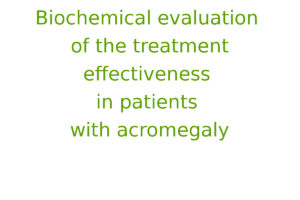Zakład Neuroendokrynologii, Międzywydziałowa Katedra Diagnostyki Laboratoryjnej i Molekularnej, Uniwersytet Medyczny w Łodzi
The results of research on "Biochemical evaluation of the treatment effectiveness in patients with acromegaly" conducted by JULITA FUSS-CHMIELEWSKA, ALEKSANDRA ROSIAK, HANNA PISAREK, KAROLINA BEDA-MALUGA, KATARZYNA WINCZYK (Folia Medica Lodziensia (2014, 41/2:181-194).).
The main treatment for acromegaly is the surgical removal of the tumour. Pharmacotherapy, usually with somatostatin analogues (SSA), is used as the preliminary and/or complementary therapy. In the diagnosis of acromegaly as well as in the evaluation of treatment effectiveness laboratory tests are essential – the serum level of growth hormone (GH) in the oral glucose tolerance test (OGTT) and the serum concentration of insulin-like growth factor 1 (IGF-1). The aim of our study was to evaluate the effectiveness of the treatment of patients with acromegaly based on biochemical criteria for cure.
Material and methods
The study group consisted of 40 patients aged 25 – 83, hospitalized in the Department of Endocrinology, Medical University of Lodz in the years 2003-2010. The concentration of GH and IGF-1 were determined by enzyme-amplified chemiluminescent immunoassay (EACLIA) on the IMMULITE 1000 analyzer (Siemens). As the criteria of acromegaly cure we assumed the normalization of serum IGF-1 and GH levels after oral glucose administration of < 1 ng/mL.
Results
The cure of acromegaly was achieved in 25 of 40 patients (63%). In 14 patients, the normalization of IGF-1 and GH was obtained as a result of surgery, 11 patients achieved normal laboratory parameters after complemantary treatment – five after the treatment with SSA, four after radiotherapy, and two after both pharmaco – and radiotherapy. Fifteen patients from the study group have not been cured – in 13 of them the complementary therapy with SSA was used. Most of them (75%) were operated due to the pituitary macroadenoma. In 11 persons both GH and IGF-1 concentrations exceeded the limits of the reference values. The effectiveness of the operation was higher in patients treated with SSA – among 21 patients treated with SSA before the surgery, only five did not achieve the normalization of GH and/or IGF-1.
Conclusions
The evaluation of GH and IGF-1 concentrations with the connection of the magnetic resonance imaging of the pituitary allow to determine the effects of acromegaly treatment. In the majority of patients after the surgical removal of pituitary adenoma, complementary therapy, mainly pharmacological with somatostatin analogues is necessary, and some patients require reoperation and / or radiotherapy. In addition, the preoperative administration of somatostatin analogues greatly increases the effectiveness of the treatment of acromegaly.
The complete study "Biochemical evaluation of the treatment effectiveness in patients with acromegaly" (JULITA FUSS-CHMIELEWSKA, ALEKSANDRA ROSIAK, HANNA PISAREK, KAROLINA BEDA-MALUGA, KATARZYNA WINCZYK) in pdf file format:
The original text taken from a:
![]() http://yadda.icm.edu.pl/yadda/element/bwmeta1.element.psjd-c853cc14-1578-4490-881e-6e7b989d07d5
http://yadda.icm.edu.pl/yadda/element/bwmeta1.element.psjd-c853cc14-1578-4490-881e-6e7b989d07d5
Folia Medica Lodziensia (2014, 41/2:181-194).
Translations
| The article "Biochemical evaluation of the treatment effectiveness in patients with acromegaly" in other languages | |
|---|---|
| Biochemiczna ocena skuteczności leczenia pacjentów z akromegalią (JULITA FUSS-CHMIELEWSKA, ALEKSANDRA ROSIAK, HANNA
PISAREK, KAROLINA BEDA-MALUGA, KATARZYNA WINCZYK) po Polsku: Biochemiczna ocena skuteczności leczenia pacjentów z akromegalią Zakład Neuroendokrynologii, Międzywydziałowa Katedra Diagnostyki Laboratoryjnej i Molekularnej, Uniwersytet Medyczny w Łodzi |  |












